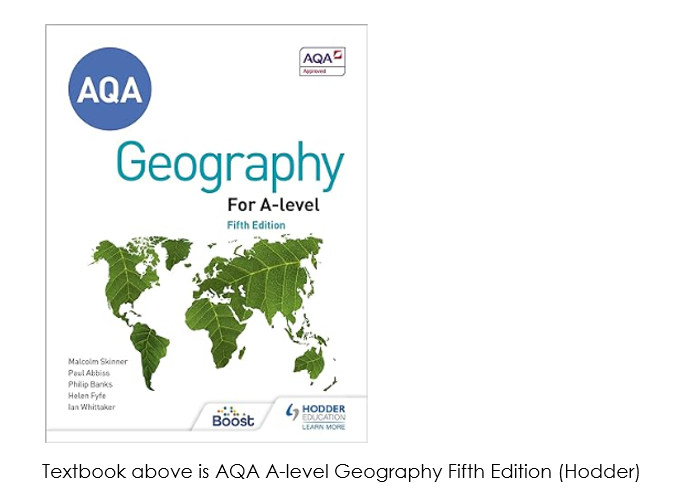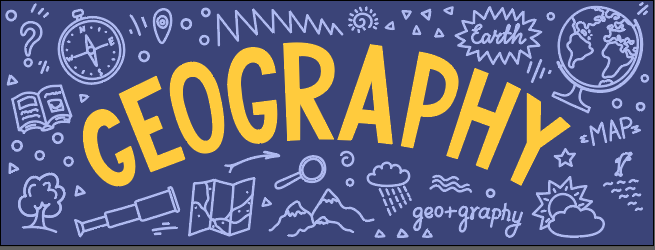Geography Curriculum Intent
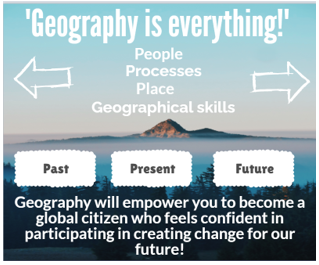
Our Geography curriculum is ambitious. It has been planned to give every pupil the knowledge of people, processes and place, and equip them with fundamental geographical skills. This will empower them to become a confident, global citizen who can participate in creating change for our future. This is our vision for all pupils’ end points allowing them to know more, do more and remember more.
The sequencing of our curriculum encourages pupils to make links between places and processes. Throughout pupils’ journey, geographical skills are threaded consistently across topics and become progressively more challenging. Combined with the breadth and depth of knowledge, it allows pupils to articulate how the past, present and future of our world is inextricably interconnected.
Year 7
Pupils begin their journey at Grace Academy through the study of diverse place-based examples of fantastic regions. They build on the fundamental concepts established in the KS2 national curriculum of locational and place knowledge, combined with human and physical geography. Pupils discover key geographical skills such as OS map reading and consolidate their KS2 locational knowledge of continents and oceans. Pupils then consider the physical and human processes and their interactions through the topics of ecosystems and tropical rainforests, ice on land, and population.

At this point, pupils are introduced to geographical theories and analysing data sources, giving them the crucial geographical enquiry skills. These enquiry skills are further developed by the study of Africa which allows pupils to ask pertinent questions about Africa’s colonial past and how it has shaped the global systems and human environments of today. The pupils will then go onto study Africa further in year 8 History.
Year 8
Pupils’ learning of human processes in Year 7 is strengthened by their first topic of urbanisation. This topic allows pupils to make links with prior learning. Pupils’ data skills are expanded upon as they are encouraged to identify patterns and make generalisations from data about place, how it has and is changing.
Additionally, pupils conduct a geographical enquiry which promotes their confidence in collecting, analysing and drawing conclusions from their fieldwork. Pupils’ understanding of physical processes and its interdependence with human environments is broadened by their learning of weather and climate and coasts. Pupils’ locational knowledge and spatial awareness is then enriched by studying significant global regions: Asia and Russia. Pupils gain exposure to GIS to investigate these regions.

Year 9
Year 9 reinforces their knowledge of how human activity relies on natural systems in their study climate change, natural hazards, development and globalisation. These topics facilitate pupils’ ability to participate in contemporary global debates, giving them the cultural capital to flourish as global citizens. Pupils’ Year 8 knowledge on coasts encourages them to make links with the study of rivers, allowing them to extend their knowledge of physical processes and landscapes. Pupils’ awareness of place is widened by learning about the Middle East. The dynamic and diverse region allows them to consider geopolitics to a higher level and discover how conflict can arise from both the scarcity and abundance of natural resources. The culmination of skills gained in KS3 invites pupils to use a range of sources from varied stakeholders to make a key geographical decision on managing water resources.
KS3 Students will be assessed through a mixture of exam-style assessments, knowledge retrieval assessments, long answer formative assessments and summative assessments. The rigour of the assessments will enable students the opportunity to make excellent progress in Geography. Assessment feedback in the form of therapy will empower pupils to reflect on how they can improve in the future.

GCSE Geography
GCSE Geography empowers pupils to build on fundamental knowledge built from the powerful way in which the KS3 curriculum is sequenced. The KS4 curriculum is intended to enhance, broaden and enrich the knowledge and skills of all pupils without disadvantaging SEND or disadvantaged students. Pupils knowledge of place and the impact people have on it, is developed when students study places like Rio de Janeiro, Nigeria, Bristol, Malaysia and Svalbard discussing the opportunities and challenges which are prevalent within these places and the intrinsic link between people and the environment. Pupils will develop an analytical understanding of this when they look at the decision-making exercise in the Peruvian Rainforest and have to consider the balance between economic development and sustainability which is a golden thread engrained throughout the Geography curriculum.
Pupils will continue to build on their knowledge of physical and human processes developed in KS3. They will discover the impacts of these processes on the physical landscape. They will then assess the human responses to these physical processes by studying real life examples in Nepal, Somerset, Italy and the Philippines.
Pupils geographical skills will be enhanced in KS4 by students attending two field trips in which they are empowered to conduct their own geographical enquiry building on what they have learnt in KS3. This is an opportunity to develop student’s cultural capital to deepen their understanding of people, place and processes because they actively participate in the enquiry.
Students will be assessed through a mixture of exam-style assessments, knowledge retrieval assessments, long answer formative assessments and summative assessments. The rigour of the assessments will enable students the opportunity to make excellent progress in Geography. Assessment feedback in the form of therapy will empower pupils to reflect on how they can improve in the future.
Geography is about everything and KS4 geographers will be able to make synoptic links between different areas of Geography to understand how the topics link together in order to go beyond the scope of the exam specification. Students should leave feeling empowered become active global citizens that participate in society.
KS4
Course information-
- Exam board used: AQA
- Method of examination: 100% exam
- Assessment includes:
- Paper 1: Physical geography. (35%) Topics: Natural Hazards, Living World, Coasts, Rivers
- Paper 2: Human geography. (35%) Topics: Urban Issues and Challenges, Changing Economic World, Resources Management & food
- Paper 3: Physical geography. (30%) Topics: Section A: pre-release booklet released by exam board to school in April 2024. Questions will be based on this booklet. Section B: Students’ own fieldwork and unseen fieldwork of other students.

Useful websites for revision and additional support:
https://www.internetgeography.net/gcse-geography-revision/

Revision and additional support:
https://www.internetgeography.net/gcse-geography-revision/
A level Geography
A level Geography enables pupils to develop their critical thinking skills of place, processes and people. The course will allow pupils to immerse themselves in key processes that are fundamental to life on Earth such as Water and carbon cycles. The KS3 and KS4 curriculum provides a vital underpinning of knowledge and skills that will empower KS5 students to be more curious and critical thinkers. This is imperative when it comes to understanding global systems and governance, ecosystems under stress and the development of urban environments. These are golden threads that run deep in our geography curriculum.
A sense of place is also at the foundation of our intent and manifests itself in the topic Changing Places. Pupils will then use the geographical skills they have acquired from KS3 and KS4 and enhance these by studying some complex statistical data techniques like Chi squared and Spearman’s rank.
During the fieldwork investigation students will undertake fieldwork in relation to processes in both physical and human geography. This will prepare them for life beyond the classroom and think critically about real life issues and produce a written investigation offering an evaluative assessment of their study.
Students will be assessed through a mixture of exam-style assessments, knowledge retrieval assessments, long answer formative assessments and summative assessments. The rigour of the assessments will enable students the opportunity to make excellent progress in Geography. Assessment feedback in the form of therapy will empower pupils to reflect on how they can improve in the future.
KS5 Geography will leave students feeling empowered to become active global citizens that participate in society and are able to articulate and synthesis between different topics and issues that impact our world.
KS5
Course information-
- Exam board used: AQA
- Method of examination: 80% exam
- Assessment including number of papers and paper titles/ content:
- Paper 1: Physical geography. (40%) Topics: Natural Hazards, Living World, Coasts, Rivers
- Paper 2: Human geography. (40%) Topics: Urban Issues and Challenges, Changing Economic World, Resources Management & food
- Non-Exam Assessment (NEA). (20%) Students choose their own topic in which to conduct fieldwork. Their NEA will be an extended report, much like a university dissertation.
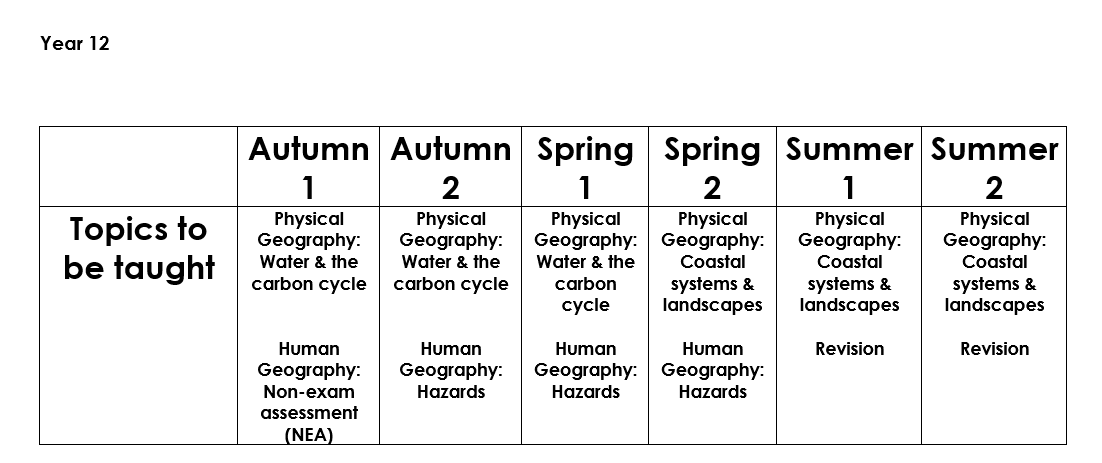
Useful websites for revision and additional support:
https://www.physicsandmathstutor.com/geography-revision/a-level-aqa/
https://www.tutor2u.net/geography
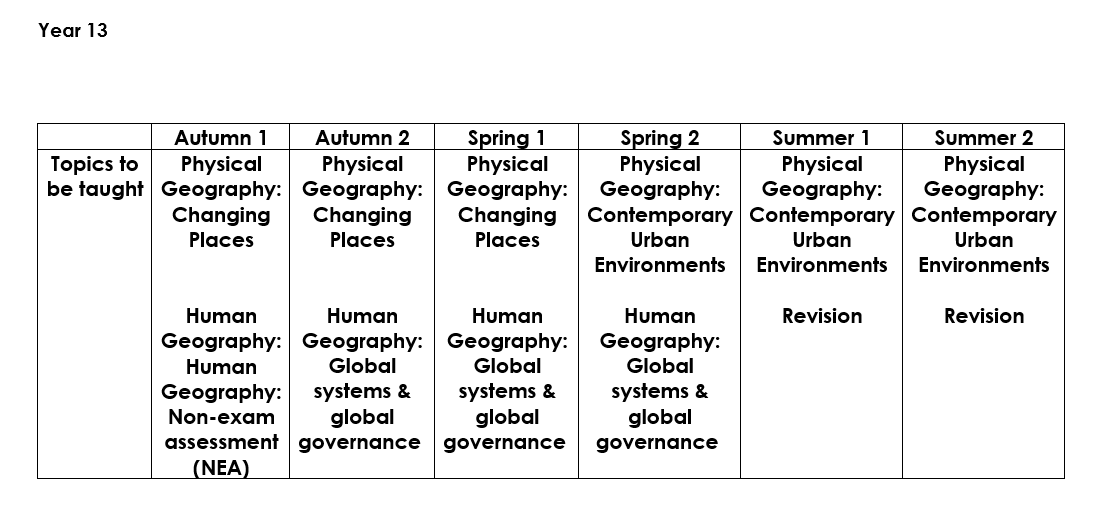
Useful websites for revision and additional support:
https://www.physicsandmathstutor.com/geography-revision/a-level-aqa/
https://www.tutor2u.net/geography
